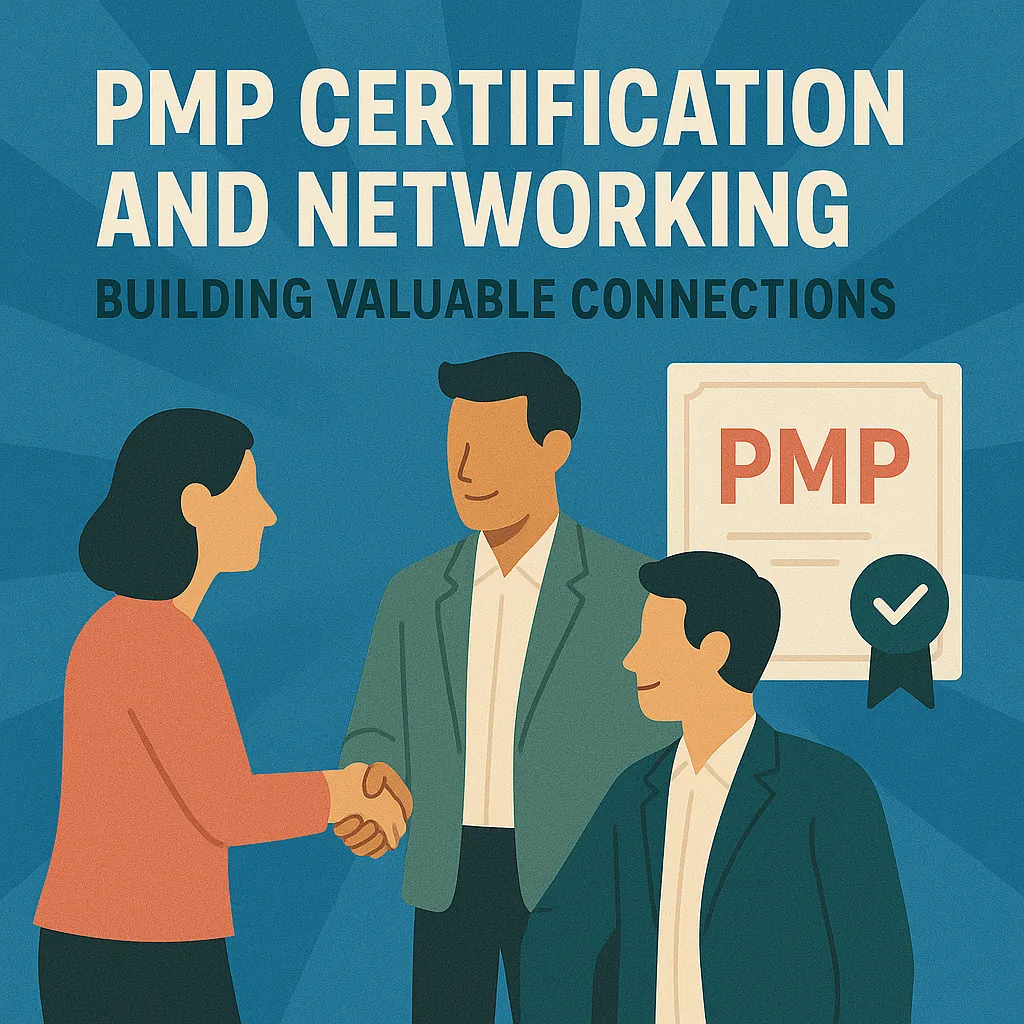Introduction
The Project Management Professional (PMP) certification stands out as a prestigious credential that signifies a high level of expertise and commitment to the profession. Offered by the Project Management Institute (PMI), the PMP certification is recognized globally and serves as a benchmark for project management competence. It not only validates an individual’s skills in managing projects effectively but also enhances their credibility in the eyes of employers and peers alike.
Networking plays a crucial role in the success of project managers. It provides opportunities to connect with other professionals, share knowledge, and collaborate on projects. A robust professional network can lead to new job opportunities, partnerships, and insights into industry trends. As project managers navigate their careers, the ability to build and maintain relationships is essential for personal and professional growth.
This blog will delve into the significant connection between PMP certification and networking opportunities. We will explore how obtaining this certification not only enhances your project management skills but also opens doors to a global community of fellow project managers. By becoming PMP certified, you gain access to a vast network that can provide support, share valuable insights, and foster collaboration, ultimately enriching your career in project management.
Understanding PMP Certification
The Project Management Professional (PMP) certification is a globally recognized credential that signifies a project manager’s expertise and commitment to the profession. Administered by the Project Management Institute (PMI), the PMP certification is designed for individuals who lead and direct projects. To qualify for this certification, candidates must meet specific educational and professional experience requirements, which typically include:
- Educational Background: A four-year degree (bachelor’s or equivalent) along with at least 36 months of leading projects, or a secondary degree (high school diploma or equivalent) with 60 months of leading projects.
- Project Management Education: A minimum of 35 hours of project management education is required, which can be obtained through various training programs or courses.
Overview of the Benefits of Obtaining PMP Certification
Achieving PMP certification offers numerous advantages that can significantly impact a project manager’s career trajectory:
- Increased Job Opportunities: PMP certification is often a prerequisite for many project management positions, making certified professionals more competitive in the job market [2][3].
- Higher Salary Potential: Statistics indicate that PMP-certified professionals tend to earn higher salaries compared to their non-certified counterparts. On average, PMP certification can lead to a salary increase of 20% or more [2][3].
- Global Recognition: The PMP certification is recognized worldwide, which can open doors to international job opportunities and collaborations [4][11].
- Mastery of Advanced Skills: The certification process equips professionals with advanced project management skills, including risk management, stakeholder engagement, and resource allocation, enhancing their ability to manage complex projects effectively [10][13].
Statistics on Career Advancement and Salary Increase
The value of PMP certification is underscored by various studies and surveys that highlight its impact on career advancement and earning potential:
- Career Advancement: A significant number of PMP-certified professionals report that obtaining the certification has led to promotions and increased responsibilities within their organizations [2][3].
- Salary Increase: According to PMI’s salary survey, PMP-certified project managers earn, on average, 20% more than those without the certification. This statistic emphasizes the financial benefits of investing time and resources into obtaining the PMP credential [2][3].
The Role of Networking in Project Management
Networking is a fundamental aspect of project management that involves building and maintaining professional relationships with individuals and groups who can provide support, resources, and insights. Within the context of project management, networking is not just about exchanging business cards; it is about creating a web of connections that can be leveraged for various purposes throughout the project life cycle. This includes accessing vital information, sharing knowledge, and discovering new opportunities that can enhance project outcomes and career growth.
Benefits of Networking
- Knowledge Sharing: Networking allows project managers to connect with peers and industry experts who can share valuable insights and best practices. This exchange of knowledge can lead to improved project execution and innovative solutions to common challenges. By engaging with a diverse group of professionals, project managers can gain different perspectives on project management methodologies and tools, which can enhance their effectiveness in managing projects [11][8].
- Opportunity Discovery: One of the most significant advantages of networking is the ability to uncover new job opportunities, promotions, and collaborations. Networking opens doors to positions that may not be advertised publicly, as many opportunities arise through personal connections and referrals. By actively participating in professional networks, project managers can position themselves favorably for career advancement [5][13].
- Mentorship: Building a network can also lead to valuable mentorship opportunities. Experienced project managers can provide guidance, share their experiences, and help less experienced professionals navigate their careers. This mentorship can be instrumental in developing skills, enhancing confidence, and making informed career decisions [10][15].
Real-Life Examples
Successful project managers often leverage their networks to achieve their goals. For instance, a project manager who actively participates in industry conferences and local project management meetups may meet a mentor who offers career advice and introduces them to potential employers. Another example could be a project manager who collaborates with peers from different organizations to share insights on project challenges, leading to innovative solutions that improve project outcomes.
Networking can also facilitate partnerships that enhance project success. For example, a project manager might connect with a vendor through a professional network, leading to a collaboration that results in a more efficient project delivery. These real-life scenarios illustrate how networking can significantly impact a project manager’s career and project success [12][14].
How PMP Certification Facilitates Networking
PMP (Project Management Professional) certification is not just a credential that enhances your resume; it also serves as a powerful tool for networking within the project management community. Here are some key points that illustrate how PMP certification can significantly expand your professional network:
- Access to Global PMP Communities and Forums: Obtaining PMP certification grants you entry into a vast network of professionals across the globe. This includes access to online forums and communities where certified project managers share insights, experiences, and best practices. Engaging in these platforms allows you to connect with peers, seek advice, and collaborate on projects, thereby enriching your professional relationships and knowledge base [1][8].
- Networking Opportunities through PMI Events and Local Chapters: The Project Management Institute (PMI), which administers the PMP certification, organizes numerous events, conferences, and workshops throughout the year. These gatherings provide an excellent opportunity for certified professionals to meet, exchange ideas, and build relationships. Additionally, local PMI chapters often host networking events, allowing you to connect with fellow project managers in your area, fostering both personal and professional growth [1][9][10].
- Building Credibility and Trust through Certification: Achieving PMP certification demonstrates a commitment to the project management profession and a mastery of its principles. This credential not only enhances your credibility but also instills trust among peers and potential employers. When you are recognized as a certified professional, it opens doors to meaningful conversations and collaborations, as others are more likely to engage with someone who has validated their skills through a respected certification [2][12][15].
Effective Networking Strategies for PMP Certified Professionals
Obtaining a Project Management Professional (PMP) certification is not just a testament to your skills and knowledge in project management; it also serves as a powerful tool for expanding your professional network. Here are some actionable strategies that PMP certified professionals can employ to leverage their certification for networking opportunities:
- Participating in PMI Events and Workshops: Engaging in events organized by the Project Management Institute (PMI) is one of the most effective ways to network. These events, which include chapter meetings, conferences, and webinars, provide a platform to meet fellow project managers, share experiences, and learn from industry leaders. Actively participating in these gatherings can help you build meaningful relationships and stay updated on industry trends [3][10].
- Utilizing Social Media Platforms like LinkedIn: LinkedIn is a powerful tool for professionals looking to connect with others in their field. As a PMP certified professional, you can use LinkedIn to showcase your credentials, share insights, and engage with content relevant to project management. Joining groups dedicated to project management on LinkedIn can also facilitate connections with other PMPs, allowing for knowledge exchange and potential collaboration [4][15].
- Engaging in Online Forums and Discussion Groups: The digital landscape offers numerous forums and discussion groups focused on project management. Participating in these online communities allows you to connect with a broader audience, share your expertise, and seek advice from peers. Engaging in discussions not only enhances your visibility but also positions you as a knowledgeable resource within the community [5][12].
By implementing these strategies, PMP certified professionals can effectively expand their networks, opening doors to new opportunities and collaborations in the field of project management. Networking is not just about collecting contacts; it’s about building authentic relationships that can lead to mutual growth and success [7][11].
Case Studies: Success Stories from PMP Certified Professionals
The Project Management Professional (PMP) certification is not just a credential; it serves as a gateway to a vast network of professionals in the field. Many PMP-certified individuals have leveraged this certification to enhance their careers through strategic networking. Here are some compelling success stories that illustrate the real-world impact of networking for PMP-certified professionals.
Advancing Careers Through Networking
- John’s Journey to Leadership: John, a mid-level project manager, obtained his PMP certification to enhance his skills and credibility. After joining the Project Management Institute (PMI), he attended several networking events where he connected with senior leaders in his industry. Through these interactions, he learned about a leadership position opening at a major firm. His networking efforts led to a successful application, and he now leads a team of project managers, attributing his career advancement to the connections he made through his PMP network [1][3].
- Maria’s Cross-Industry Collaboration: Maria, a PMP-certified project manager in the tech sector, attended a PMI conference where she met professionals from various industries. This networking opportunity allowed her to collaborate on a cross-industry project that combined technology and healthcare. The project not only expanded her skill set but also resulted in a successful product launch that garnered recognition in both sectors. Maria emphasizes that the relationships she built at the conference were instrumental in this collaboration [2][10].
Examples of Collaborations from Networking Events
- The Power of Peer Connections: At a local PMI chapter meeting, a group of PMP-certified professionals formed a study group that evolved into a consulting firm. They pooled their expertise to offer project management services to small businesses, significantly increasing their income and professional visibility. This collaboration showcases how networking can lead to entrepreneurial ventures and mutual support among peers [4][11].
- Mentorship Opportunities: Networking events often lead to mentorship relationships. For instance, a PMP-certified individual met a seasoned project manager at a workshop who later became a mentor. This relationship provided invaluable guidance, helping the individual navigate complex projects and ultimately secure a promotion. Such mentorships highlight the importance of building relationships that can foster professional growth [5][12].
Lessons Learned from Networking Experiences
- Be Proactive: Many PMP-certified professionals stress the importance of being proactive in networking. Attending events, engaging in discussions, and following up with contacts can significantly enhance one’s professional network. John, for example, made it a point to reach out to speakers after presentations, which led to fruitful conversations and opportunities [6][8].
- Diversify Your Network: Networking is most effective when it includes a diverse range of professionals. Maria learned that connecting with individuals from different industries not only broadened her perspective but also opened doors to innovative collaborations. This lesson underscores the value of seeking connections beyond one’s immediate field [7][9].
- Follow Up and Maintain Relationships: Successful networking is not just about making connections; it’s about nurturing them. Many professionals recommend setting reminders to follow up with contacts periodically. This practice helps maintain relationships and keeps one’s network active and engaged, which can lead to future opportunities [3][10].
Challenges in Networking and How to Overcome Them
Networking is a crucial aspect of professional growth for project managers, especially for those holding a Project Management Professional (PMP) certification. However, several challenges can hinder effective networking. Here are some common barriers and strategies to overcome them:
Identifying Barriers to Effective Networking for Project Managers
- Shyness and Reluctance: Many project managers may feel intimidated in networking situations, particularly when interacting with senior professionals or peers from different industries. This shyness can prevent them from initiating conversations and forming connections.
- Time Constraints: Project managers often juggle multiple responsibilities, making it difficult to allocate time for networking activities. The demands of project deadlines and team management can lead to networking being deprioritized.
- Lack of Reference: Without a strong professional network, project managers may struggle to find opportunities or references that can facilitate introductions to potential contacts. This lack of connections can create a cycle of isolation.
Strategies to Overcome Networking Challenges
- Developing an Elevator Pitch: Crafting a concise and engaging elevator pitch can help project managers introduce themselves confidently. This pitch should highlight their skills, experiences, and what they seek from networking interactions. Practicing this pitch can reduce anxiety and make it easier to approach others at networking events [10].
- Setting Realistic Goals: Establishing specific, measurable goals for networking can help project managers stay focused. For instance, aiming to connect with a certain number of new contacts at each event can provide a clear target and motivate them to engage more actively [13].
- Leveraging Managed IT Services: For project managers facing challenges in communication and collaboration, utilizing managed IT services can streamline processes and enhance team interactions. This can free up time for networking and improve overall project management efficiency [2][5].
- Seeking Diverse Opportunities: Encouraging project managers to explore various networking avenues—such as industry conferences, local meetups, and online forums—can broaden their professional circle. Engaging with diverse groups can lead to unexpected connections and insights [12].
- Active Participation in Events: By actively engaging in networking events and initiatives, project managers can build strong professional relationships. This involvement not only enhances visibility but also fosters a sense of community among peers [11].
Conclusion
The value of networking cannot be overstated, and obtaining a PMP certification significantly enhances one’s ability to build valuable connections. Here are the key points that highlight the benefits of PMP certification in expanding professional networks:
- Access to a Global Network: PMP certification provides project managers with access to a vast and diverse community of professionals. This global network includes fellow certified project managers and industry experts, facilitating connections that can lead to collaborative opportunities and knowledge sharing [2][10].
- Enhanced Professional Marketability: With a PMP certification, project managers are recognized for their competence and expertise, making them more attractive to potential employers and collaborators. This recognition opens doors to networking events, professional associations, and industry conferences where valuable connections can be made [11][13].
- Opportunities for Learning and Growth: Engaging with the PMP community allows project managers to stay updated on industry trends and best practices. Networking with peers can lead to mentorship opportunities, sharing of resources, and insights that can enhance one’s project management skills [15].
- Increased Career Advancement Potential: The connections made through networking can lead to new job opportunities, partnerships, and collaborations that may not have been accessible otherwise. The relationships built within the PMP community can be instrumental in advancing one’s career [10][12].
In conclusion, pursuing a PMP certification is not just about enhancing project management skills; it is also a strategic move to expand your professional network. The benefits of networking through PMP certification are substantial, providing project managers with the tools and connections necessary to thrive in their careers.
Find out more about Shaun Stoltz https://www.shaunstoltz.com/about/.
This post was written by an AI and reviewed/edited by a human.



